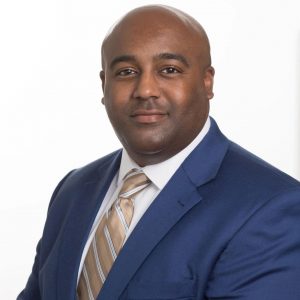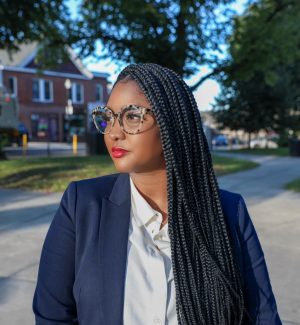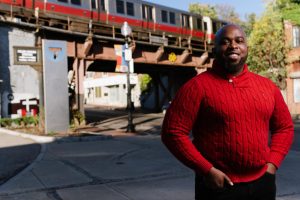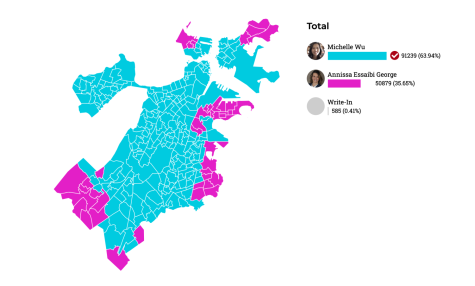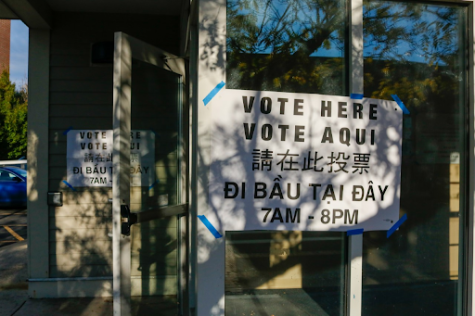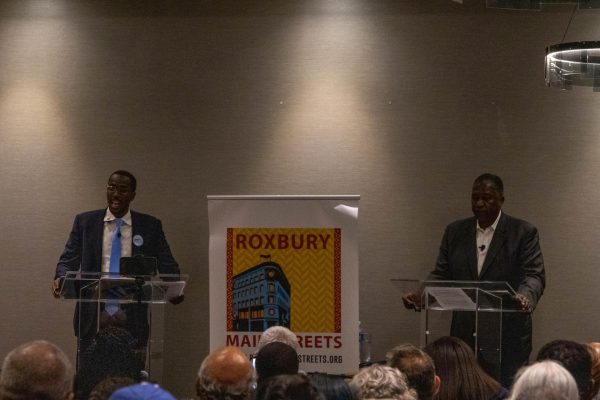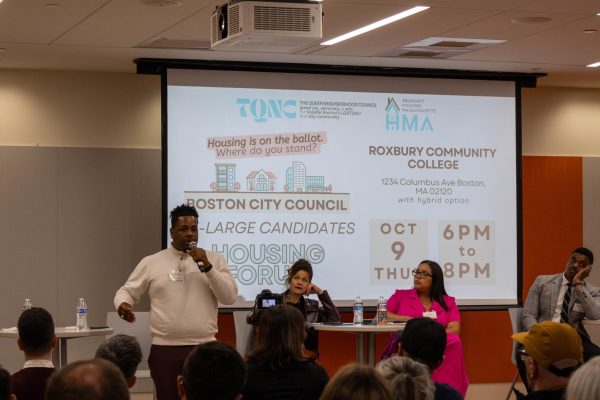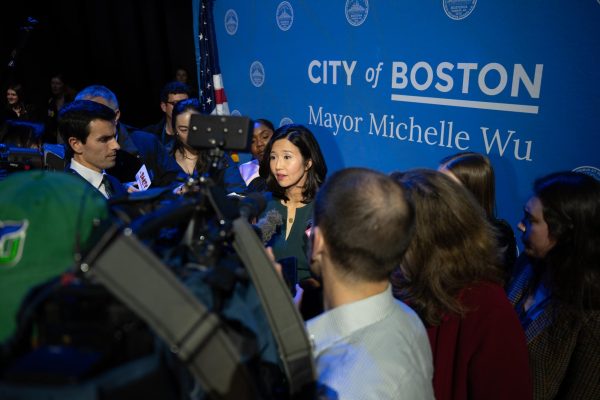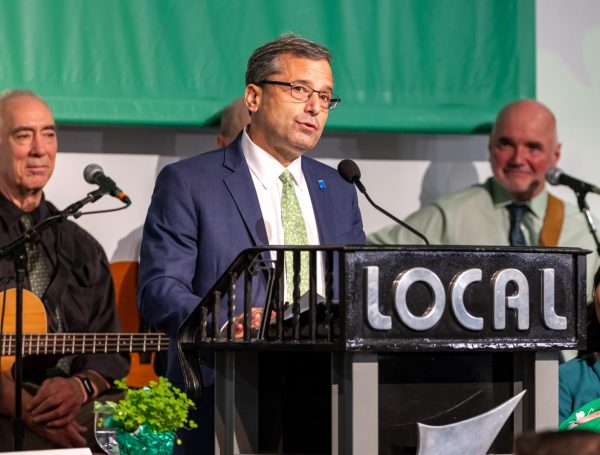City council race: Alex Gray running for at-large seat
Alex Gray of Jamaica Plain is running to secure a seat at the table for the disability community in Boston’s city council.
If elected, Gray would be Boston’s first blind city councilor.
Michael Flaherty, Julia Mejia, David Halbert, Kelly Bates, Ruthzee Louijeune, Erin Murphy, Carla Monteiro, Jon Spillane, Domingos DaRosa, Said Abdikarim, Nicholas Vance, Munim Khan, James Colimon and Bridget Nee-Walsh are also running for an at-large seat. Councilors at large Michelle Wu and Annissa Essaibi-George are running for Boston mayor.
Gray grew up in Quincy and is now living in Jamaica Plain with his wife, Lauren. He went to Boston College, then Suffolk Law School and has lived and worked in the city for the past 20 years.
After graduating from Boston College, Gray spent a year in California in the Jesuit Volunteer Corps working with individuals facing homelessness. Upon returning to Boston, he worked for the Massachusetts Housing and Shelter Alliance as their legislative liaison, advocating for permanent housing solutions for individuals facing homelessness. He also worked under Governor Deval Patrick, advising him on transportation policy before joining Mayor Marty Walsh’s administration as policy manager in the Office of Workforce Development.
“I wasn’t born a great listener, but you know when you go blind, you have to be [a great listener] to do all the things you want and achieve the dreams in your life,” he said, “whether it was succeeding in school or work or even just being a friend or family member, that ability to listen has always really been one of the most crucial abilities that I’ve had.”
Gray’s priorities, he said, are housing affordability, representation for the disability community and workforce development. “I think there’s an opportunity on the workforce development front to really have a conversation about what industries are going to be crucial for Boston post pandemic,” he said. “I think really having that conversation about what jobs are going to be the ones that pay well and have upward mobility, and directing our residents through training programs into those jobs is going to be crucial to recover from the pandemic.”
The Scope spoke with Gray about his campaign’s top issues and his plans to address them if elected city councilor at-large. The following conversation has been edited for length and clarity.
You would be Boston’s first blind city councilor and your team said that you want to make sure that when we talk about diversity, the disabled community has a seat at the decision making table. What’s your vision of what that would look like for the city?
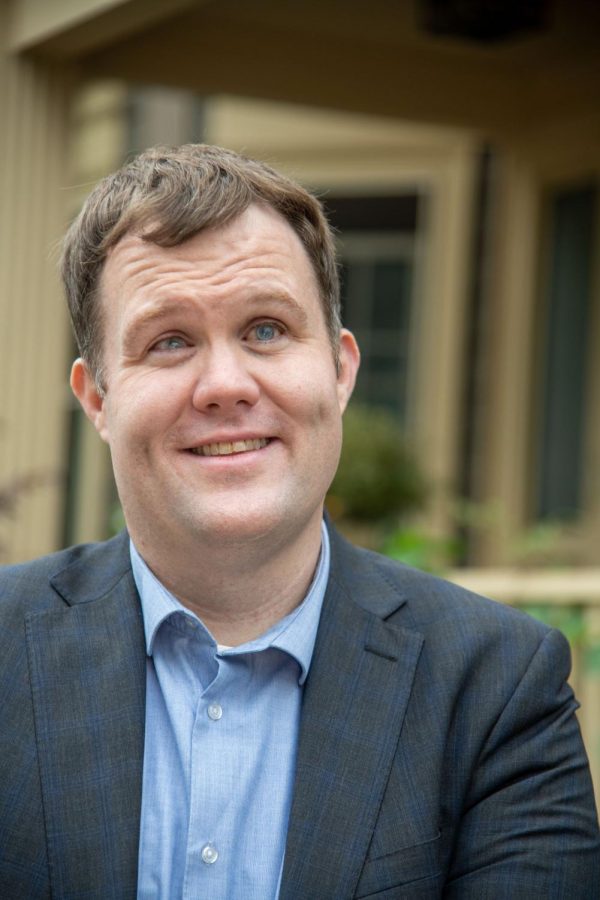
Thank you for the question. I think that everybody deserves to have a seat at the table and certainly the disability community is no different in that regard. I don’t think disability issues are inherently more important or less important, I think it’s important that everybody has equal access. So I think when we talk about a lot of issues, whether it’s transportation, people with disabilities need reliable transportation.
As somebody who’s blind, I rely very much on reliable access to public transportation so I think it’s just really important — when larger conversations are going on around access to resources — to [discuss] the things that benefit people with disabilities, whether it be an elevator in a building or a subway station. We think of that in some ways as a resource for people with disabilities but I think it’s also helpful to seniors, people who may just have sprained their ankle, … parents pushing strollers. That’s something that benefits not just the disability community but benefits a large swath of people.
I think it’s also important because I wasn’t born with a disability. I was born fully sighted, I started to go blind around age eight. So I think when we talk about the fact that one out of four adults in America has a disability, that over time — and I certainly don’t say this to scare anybody — but in a day, a week, a month, a year, either you or somebody you love, a child, a grandchild, a spouse may become disabled. So these don’t just exist in a vacuum. I think the things that we talk about, the benefits that come from advocating for better policies have the ability to impact people as time goes on, not just currently.
What has been your experience living and working in Boston?
Yeah, so I’ve spent my whole career in public service. After I graduated from Boston College, I spent one year out in California, in a year-long program called the Jesuit Volunteer Corps, sort of similar to City Year or AmeriCorps. I worked with adults facing homelessness out there. After that, I came back and worked for the Massachusetts Housing and Shelter Alliance as their legislative liaison, advocating for permanent housing solutions for individuals facing homelessness. I went to Suffolk law school, came back and had the great opportunity to work for Governor Deval Patrick advising him on policy, in particular on transportation during the point in his administration where it was launching the Fairmount commuter rail line. And then for the past several years I’ve worked for Mayor Marty Walsh, most of that time in the Office of Workforce Development.
In these various roles you’ve worked for the city and the state, what you think is working and not working in Boston and what do you think can be changed?
I think that the city of Boston is a diverse city and the diversity of its people and its neighborhoods is what gives it its strength. I think one of the things we just need to make sure is that those opportunities are available to everybody. And I think when we talk about access to resources or inequities, we need to make sure that, certainly, communities of color are at the table. We need to ensure that frontline workers, especially in the time of the pandemic, that we’re centering them in our conversations.
I think we should also really think a lot about people with disabilities and our seniors because I think those are folks who have a really unique life experience, and they struggle with a lot of issues around economic inequities, access to health care, transportation. And I think, particularly with the disability community, it’s a group of people that understand what it means to face challenges and barriers and they are a group of people that I think face inequities around education or economic inequality or lack of access to health care.
This is a group of people, roughly one out of four adults, that is an ally for you. And I think when the disability community has been activated, they’ve been able to really be an ally to other folks so I think there’s a really win-win situation with sort of mobilizing and activating the disability community to be an ally for other groups as well.
What made you decide to run?
I would say I think that I bring a unique balance of work and lived experience. You know, my work has brought me to every neighborhood in the city of Boston, and it’s allowed me to take the time to listen to people, hear their stories and take action on their behalf. I’ve never really understood an issue the way that I needed to until I’ve taken the time to listen to them and to hear their stories and hear how an issue or policy impacts them.
I wasn’t born a great listener, but you know when you go blind, you have to be [a great listener] to do all the things you want and achieve the dreams in your life. I’ll be honest, I probably started developing my listening skills to keep following the Red Sox, the Celtics, and the Patriots. But as time went on, whether it was succeeding in school or work or even just being a friend or family member, that ability to listen has always really been one of the most crucial abilities that I’ve had.
And then, the second piece, moving away from the work experience, is the lived experience. I think the Boston City Council rightfully has gained a reputation for being a diverse and representative body, and the city has become stronger as a result of that. We’re having conversations about issues, whether it’s issues that are important to women that maybe weren’t talked about or families or you know conversations on race and ethnicity and sexual orientation.
These are conversations that are important and that need to take place. But I think people with disabilities — and this is not just in Boston, this is really a national problem — we don’t have a lot of people with disabilities in elected office, And so I think that, again we can be an ally to other groups facing challenges and I think we also bring a unique perspective to the table. I truly believe that if you were to raise disability, give it a seat at the table, and again, not to be more important or less important but to have an equal stake in the conversation, then I think Boston could claim that we have the most diverse and representative council in America.
You mentioned your work has brought you to neighborhoods in the city of Boston and talked to people there. What type of issues do you hear people voice their concerns about the most?
I think that, obviously, whoever is elected this fall is still going to be dealing with COVID-19. And you know, there’s a lot of realities that touch just about every aspect of day-to-day life here in Boston. But I think for me, when I talk to people, I hear a lot about housing, the ability to afford housing is really important.
But I also think one element of it that I’m talking a lot about is that the physical accessibility of housing and I think that’s an issue that’s really important to senior citizens, I think it’s important to people with disabilities and I’ve seen nationally that maybe 1% of housing is accessible to people who use wheelchairs. So I think that we want Boston to be a place where people can live and grow old and to stay and we want it to be a place that’s welcoming for people with disabilities. So I think on housing, I can really bring a perspective on the accessibility piece that sometimes is left out of the conversation.
I think another thing for me is the best way we can help somebody find the path to the life that they want to live and to be able to do and afford all the things that they want for their life is to give them a good job that pays good wages and gives them the benefits that they deserve.
I’ve done that work in the Office of Workforce Development. We look at sectors where that are growing that have ladders to careers that people can move up in. We design programs with employers that have credentials, that allow people to learn and earn money while they’re training in that industry. I think we can target those programs to underserved communities, low income neighborhoods and people with disabilities. I think there’s an opportunity, particularly with the Biden administration that we’ll be investing in workers and I think we’ll have a Secretary of Labor in Marty Walsh that is, I believe, one of the strongest voices for working people in our country.
You talked about housing affordability, fixing the impact that the COVID-19 pandemic had on people’s lives, workforce development. You also mentioned earlier that you had experience working with homelessness issues. Those are all the very big issues here in Boston. What issue will you focus on if you become a councilor?
I think at the top of the list kind of 1A and 1B is expanding housing that’s both affordable and physically accessible to as many Bostonians as possible. Number two is working to create jobs that have pathways to careers that pay living wages and provide benefits, and a secondary one is just to really ensure that in all places where decisions are made — inside the city council, across the city and with employers with nonprofits with universities — to make sure that disability has a seat at the table.
A study last year in 2020 showed that almost every organization is talking about diversity, equity and inclusion and there’s a lot to talk about that in every aspect of. It is important. But sadly, 96% of organizations when they talk about diversity, equity, inclusion, they do not talk about disability so I think that would be a big part of my work is to just really be a champion for people with disabilities.
Do you have specific plans to achieve these goals that you talked about?
Sure, I think when we talk about housing, obviously, there’s a few pieces to it, right? Boston produces, I think, more subsidized or affordable housing than any, you know, [major city]. So I think we have to sort of start the conversation with talking about what we do well. But the need is still there and the demand is still there, so how do we move beyond that. And I think we can have conversations around the use of public land. I know that the city council has had some conversations around that, whether it’s building housing on top of the existing city properties.
There’s a conversation right now in Egleston Square about doing such that. I think we can talk about strategic density in and around subway stations. I think that’s a particular area of importance because — whether you are a young person struggling to pay your bills and you can’t afford a car or you don’t want to drive for environmental reasons or you are a senior or somebody with a disability and it’s hard for you to drive or you can’t drive — living in proximity to the subway is such a big asset to allow you to do all the things that you need to do in your life, go to school, get to work or even to just have access to health care or public spaces so I think that would be really important.
And I think there’s an opportunity on the workforce development front to really have a conversation about what industries are going to be crucial for Boston post pandemic and again I don’t pretend to have a monopoly on ideas, I have some, but I think really having that conversation about what jobs are going to be the ones that pay well and have upward mobility and directing our residents through training programs into those jobs is going to be crucial to recover from the pandemic.
Mayor Walsh had the idea to start a tuition free community college program about five years ago and we were able to identify the funding to create the program. And my boss came to me and said, ‘I have this idea and we got to make it happen.” And so we spent some time sketching out what it might look like, you know, how many students might want to apply, how much money it would require.
Really, I mean, we started with a blank Word document and went from there and we came up with this idea of covering tuition and mandatory fees. But it really wasn’t until we went out into the neighborhoods as it was important for my boss and the mayor for us to go from high school to high school across the city and [have conversations] and I’ll never forget a guidance counselor at Fenway high school really having a candid conversation with us and talking about the fact that when she talked about higher education with her students, the conversations went in directions that I weren’t always connected with education but were crucial to educational success. So things like how could we afford books each semester, technology in terms of students may have had a laptop but it was on its last legs or they might have to give it back or the fact that the [Boston Public Schools] provided access to subway passes for its students but if students graduate, they may not have those.
So what we did was we took all that feedback and we added a stipend to the program and we went from serving 50 kids, to over 500 kids now. So I think, ideas are really important because that’s the starting point, but I think it’s that next couple phases the implementation phase is hard, but it’s really the management phase, that’s really the hardest of all of them, and you know I’ve had that experience going from the starting gate to the finish line and like I said, that would allow me to do the job on day one. And again, I think that that’s because not only I have ideas and I have some experience but I’m always going to take the time to listen to people and allow them to help me understand the issue in a way that I need to.
Is there anything else you wanted to say to our readers that I haven’t asked you?
I think people with disabilities are people that have unique skills and perspective, I mean, we’ve seen recently with somebody like Amanda Gorman, who is an incredible poet who has a disability. Stephen Hawking was a genius who had a disability and Greta Thunberg is a great climate advocate and she has a disability. So we know that the talent and the perspectives are valuable. So often, people with disabilities were just lacking an opportunity and so again, I would be Boston’s first ever blind city councilor and I just think it’s really important that the person being a champion for people with disabilities [occupies] the at-large seat because I think that, whether you’re somebody in Hyde Park who maybe is neurodiverse or has a learning disability or you’re somebody in East Boston who is, you know, deaf or has hearing loss or you live in Beacon Hill and you’re blind, I think that you all deserve to have somebody with the lived experience of a disability in representing you and I think that’s the great opportunity of the at-large city council seat.




